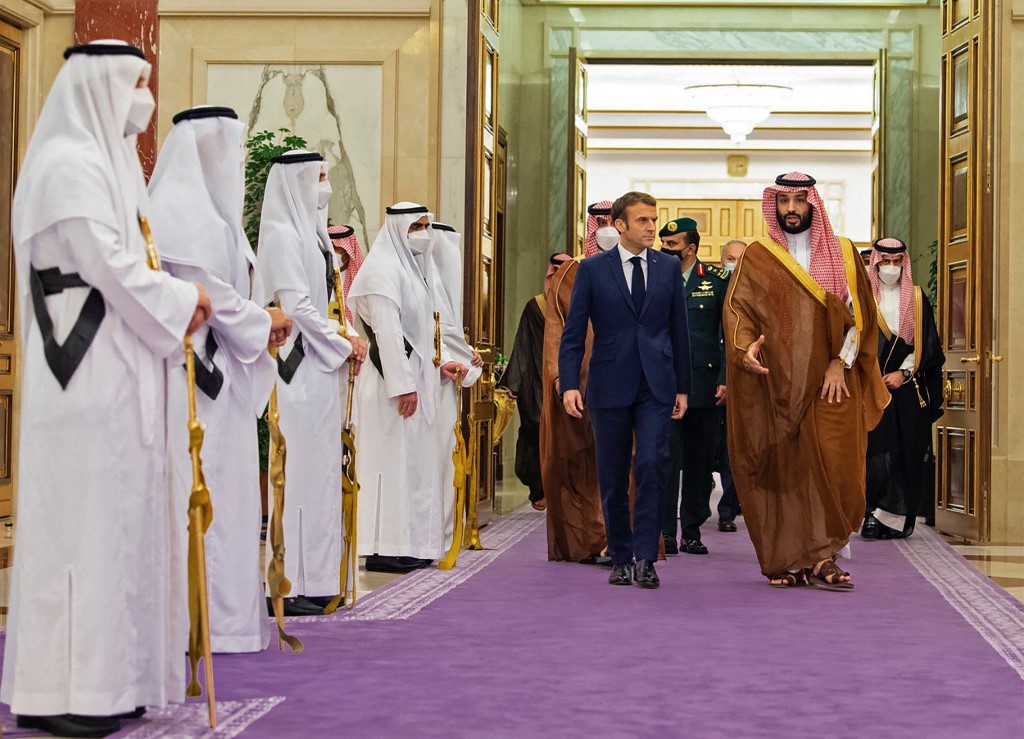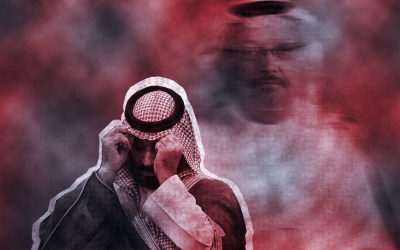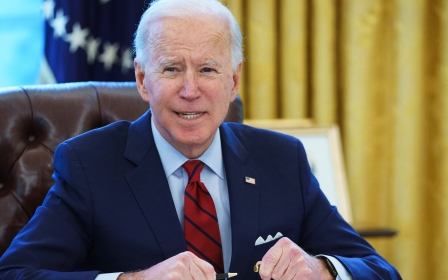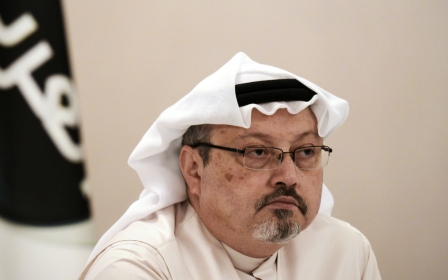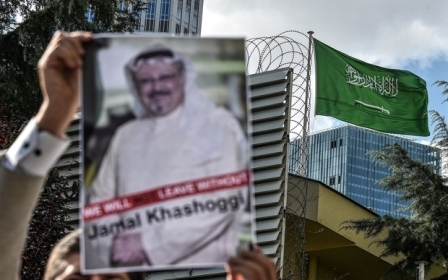Why state actors want to bury Jamal Khashoggi
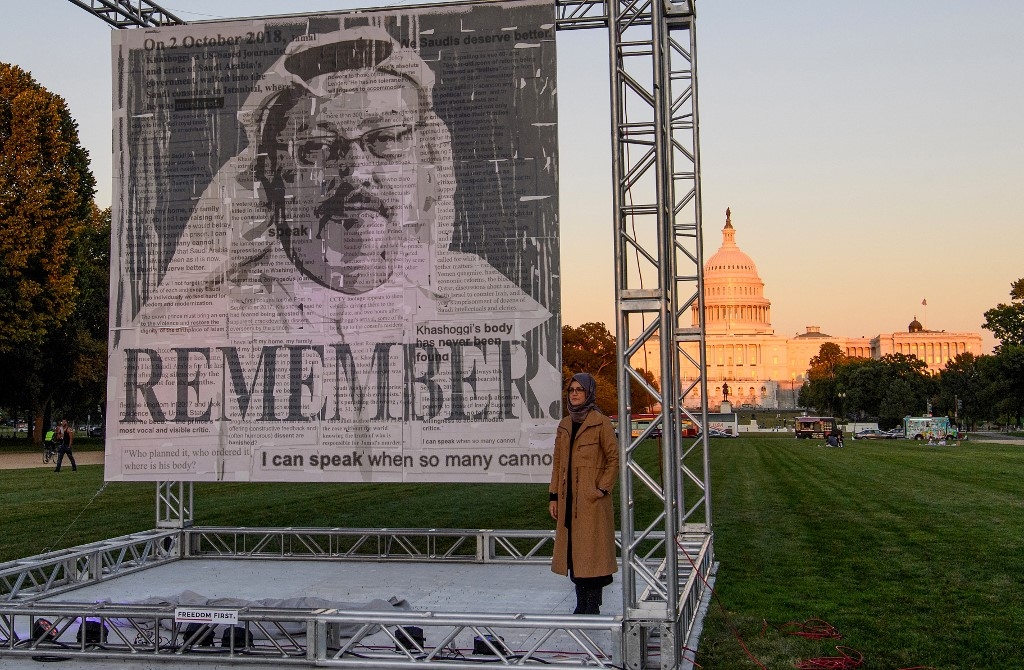
Two questions remain unanswered from the murder of journalist Jamal Khashoggi in the Saudi consulate in Istanbul three years ago: Who definitively gave the orders to kill him, and what happened to the body?
The CIA, Turkish intelligence and British Secret Intelligence sources all believe the culprit is Saudi Crown Prince Mohammed bin Salman (MBS). But until now, this has been their supposition, based on their calculation that such a large operation involving his core team of bodyguards could not have been launched without his approval.
The sad truth is that three years on, all the state actors involved want to bury Khashoggi, with or without a body
Just weeks after Khashoggi was murdered, an even bigger assassination squad allegedly arrived in Toronto to kill Saad al-Jabri, a former official in the Saudi interior ministry. The team, known as the Tiger Squad, was flagged and turned back at the airport. Jabri said that the Tiger Squad was created when he personally refused a request from MBS to use interior ministry special forces to extradite a Saudi prince living in Europe.
In Khashoggi’s case, there has been no confession, no testimony and ultimately no proof that MBS issued the orders. And that is liable to remain the case after the release on Wednesday of Khaled Aedh al-Otaibi, a man French authorities had arrested on the grounds that he was wanted by Interpol on an international arrest warrant for his role in the killing of Khashoggi.
This man could have answered both questions. A former member of the royal guard who travelled with MBS on some of his foreign trips, Otaibi was allegedly in the consul’s private residence at the time of the killing, and was responsible for the disposal of Khashoggi’s remains - meaning he would be able to answer questions on whose orders the 15-member kill squad acted, and what happened to Khashoggi’s remains.
Business as usual
The Saudis claimed from the start that the French had got the wrong man and that this was a case of mistaken identity: “Media reports suggesting that a person who was implicated in the crime against Saudi citizen Jamal Khashoggi has been arrested in France are false,” a Saudi official said. “Those convicted of the crime are currently serving their sentences in Saudi Arabia.”
Turkish officials beg to differ on the issue of identity. They say that the Saudi man caught by French authorities carried a passport belonging to the team that killed Khashoggi, with the same name and passport number. The Turks compared scans of the passport provided by the French to their own scans, taken as the Tiger Squad passed through the VIP section of the Istanbul airport on the day of the killing.
The chief prosecutor in Paris said in a statement that in-depth verifications to determine the identity of the person had established that the warrant did not apply to him. Had the chief prosecutor decided otherwise, a real diplomatic incident would have blown up, because the sad truth is that, three years on, all the state actors involved want to bury Khashoggi, with or without a body.
Neither Turkey, nor France, nor indeed the US, want the diplomatic standoff created by Khashoggi’s murder to continue. They all want to do business with the crown prince.
Otaibi was detained under an international arrest warrant issued by Interpol on behalf of a Turkish court, which is still trying 26 Saudis in absentia. Last month, this court asked Saudi authorities whether the suspects on trial in Istanbul had faced justice in Riyadh.
Saudi Arabia has never confirmed the identities of eight men convicted in a sham trial the Saudis conducted. If the answer were to come back as “yes”, then, in theory, the Turkish court could drop the case on the grounds that the same men could not be tried twice for the same crime. But Turkey has at no point withdrawn the international arrest warrants for the 26 Saudis it alleges are responsible for Khashoggi’s murder.
Restoring relations
One government source told MEE that the extradition of Otaibi could have been an opportunity to close the Khashoggi case by putting all the blame on this man. There can be no doubt that Turkey does indeed want to restore relations not just with Saudi Arabia, but with MBS personally - and this could not be achieved without closing the Khashoggi case.
Turkish President Recep Tayyip Erdogan has called Saudi King Salman twice. Erdogan’s adviser, Ibrahim Kalin, has said publicly that he thinks Turkey and Saudi Arabia should move on, and lately, there have been efforts to arrange a meeting between the Turkish president and the Saudi crown prince in Doha.
This did not happen because their itineraries “did not align”, but it now seems that it is only a matter of time before they meet.
Saudi Arabia was left out of the widely touted and very public rapprochement between Erdogan and Abu Dhabi Crown Prince Mohammed bin Zayed (MBZ), which resulted in a $10bn programme of Emirati investments in Turkey. An Emirati delegation is in Ankara to talk about buying Turkish drones.
But despite the warm signals emanating from Ankara, the Saudi boycott of Turkish goods continues, and a recent decision to close Turkish schools in the kingdom stung Ankara.
Whereas nothing is personal for MBZ, and his pragmatism is such that he can today embrace Erdogan - who in 2016 he very much wanted to depose - for MBS, everything is personal. The Saudi prince blames Erdogan himself for the three-year campaign that turned the future king into an international pariah.
Cashing in
France also wants to cash in on MBS’s restitution. President Emanuel Macron became the first western leader to break the diplomatic isolation of the Saudi prince by meeting him publicly last week. The fig leaf for the meeting was Macron’s attempts to mediate the rift between Saudi Arabia and Lebanon, created by Lebanese Information Minister George Kordahi’s public criticism of the Saudi-led war on Yemen.
The substance of the meeting, from Macron’s point of view, was the imminent arrival of a business delegation of 100 French companies, including TotalEnergies, EDF, Thales and Vivendi. Defending himself against accusations that he was putting MBS back in the saddle, Macron told reporters in Dubai: “We [can] decide after the Khashoggi affair that we have no policy in the region, which is a choice some can defend, but I think France has an important role to play in the region. That doesn’t mean we are complicit or that we forget.”
Once again, killers and psychopaths are allowed to strut across the international stage, as big business grovels and fawns in their company
Oh yes, it does.
Agnes Callamard, whose report as the former UN special rapporteur on extrajudicial, summary or arbitrary executions uncovered more facts about the Khashoggi murder, said that it pained her to see France, “the country of human rights”, becoming the instrument of a policy to rehabilitate the Saudi prince.
Finally, US President Joe Biden, who has yet to call MBS, also wants to bury Khashoggi. Leaving all those fiery words he said as presidential candidate far, far behind him - what was that about Saudi Arabia being a “pariah state” with “no redeeming social value?” - Biden decided early in his presidency not to penalise the crown prince, despite US intelligence finding that he directly approved of the killing.
Once again, western nations have failed the very standards of justice and human rights that they use to justify beating, sanctioning and bombing nations around the world. Once again, lip service is paid to the cause of protecting journalists who pay with their lives for speaking out. Once again, killers and psychopaths are allowed to strut across the international stage, as big business grovels and fawns in their company.
What did Jamal Khashoggi’s death change? Nothing. The only surprise is that the campaign to seek justice for his killers lasted three years.
- The views expressed in this article belong to the authors and do not necessarily reflect the editorial policy of Middle East Eye.
This article is available in French on Middle East Eye French edition.
Middle East Eye propose une couverture et une analyse indépendantes et incomparables du Moyen-Orient, de l’Afrique du Nord et d’autres régions du monde. Pour en savoir plus sur la reprise de ce contenu et les frais qui s’appliquent, veuillez remplir ce formulaire [en anglais]. Pour en savoir plus sur MEE, cliquez ici [en anglais].



